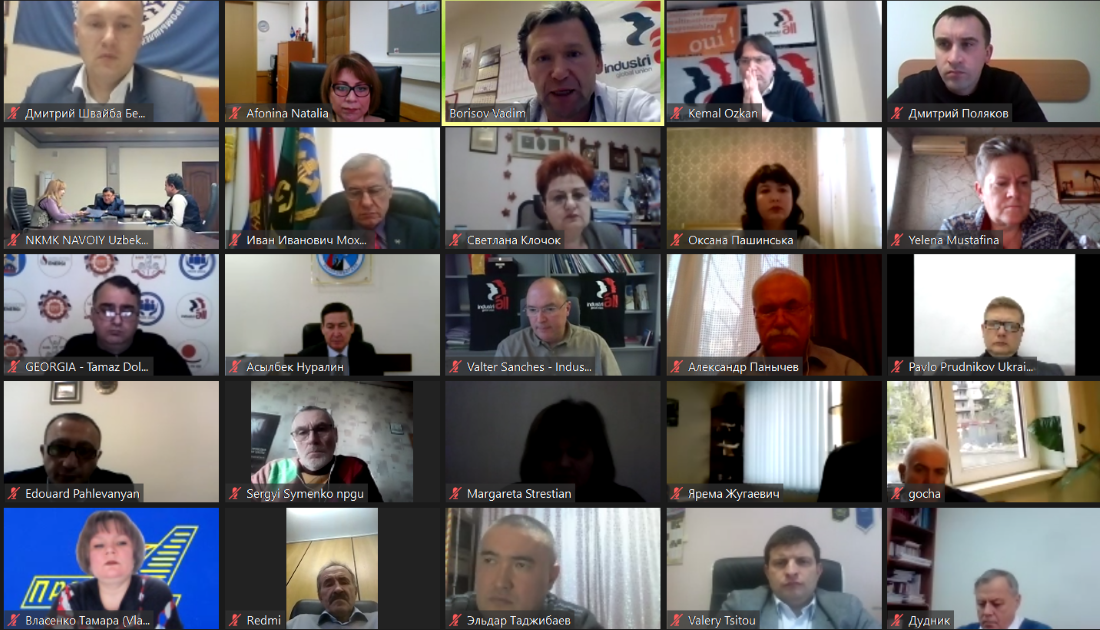15 December, 2020Over 50 union leaders and activists from 45 affiliates in eleven Eastern European and Central Asian countries met to discuss challenges, victories and union experiences during the pandemic.
IndustriALL regional secretary Vadim Borisov outlined virtual actions and campaigns and how IndustriALL supports affiliates in the region.
In addition to the pandemic, unions have had to deal with unprecedented attacks on workers’ rights.
In Kyrgyzstan, unions have been fighting against the adoption of an anti-union draft law, depriving workers of freedom of association and unions of their independence.
In Ukraine, unions managed to slow down the promotion of anti-union and anti-worker draft laws, but the government is now pushing similar norms by splitting them into several new bills. Ukrainian unions continue to demand timely wage payments; wage arrears to workers in state-owned mines now amount a record UAH 1.89 billion (US$ 67,6 million) and dates back as far as 2015.
In Belarus, unions and workers are fighting for democracy and against repression. Many leaders and activist from independent unions have been dismissed, detained and prosecuted.
In Kazakhstan, unions are fighting for early retirement for those working in difficult and harmful conditions after a new labour code cancelled several benefits and guarantees, and made 63 the retirement age. This led to many workers looking for better working conditions and benefits in Russia.
In some countries in the region, unions have managed to achieve positive legislative changes.
In Russia, amendments to the Labour Code on remote work were adopted to regulate working conditions for about six million people who work from home due to the pandemic. Amendments include work schedule, health and safety and compensation of expenses covered by the employer.
Similar amendments related to remote work were adopted in Belarus and Moldova.
In Georgia, years of union struggle has resulted in the adoption of amendments to the Labour Code, introducing proper labour inspections, mandatory rest time and anti-discrimination in line with the 2014 EU-Georgia Association Agreement. The EU was an important leverage in improving legislation.
In Uzbekistan, a new law on trade unions adopted in 2019 has received good reviews from international experts. The Labour Inspectorate has been reinstated, and the 1996 Labour Code will be replaced by a new one under public debate.
In Armenia, the Trade Union of Miners, Metallurgists and Jewellers of Republic of Armenia agreed with industry employers on payment of full wages instead of two thirds, in case the company would stop production due to the pandemic.
Participants welcomed Gulandom Huseynova, chair of the Textile and Light Industry Workers’ Union of Tajikistan, that may join IndustriALL in 2021.
IndustriALL general secretary Valter Sanches spoke on how IndustriALL adjusted its work during pandemic in order to support affiliates the best possible way. Sanches also briefed participants on preparations of IndustriALL Global Union’s 3rd Congress, which will take place virtually in September 2021.
IndustriALL assistant general secretary Kemal Ozkan congratulated affiliates on handling Covid-19 in the workplace, taking necessary measures to protect workers’ health and safety, protecting income, making sure companies continue in a sustainable way by using legislation, collective agreements and social dialogue.
“There are universal values that IndustriALL wants to see everywhere for stronger democracy, democratic governance and fundamental human and labour rights."
“Belarus will continue to be on our, and our allies, agenda until justice has arrived. In Kyrgyzstan, we need a democratic establishment and stability, and Ukraine needs a sustainable economy respecting workers’ rights.”
“IndustriALL will always support its affiliates in their struggles.”
